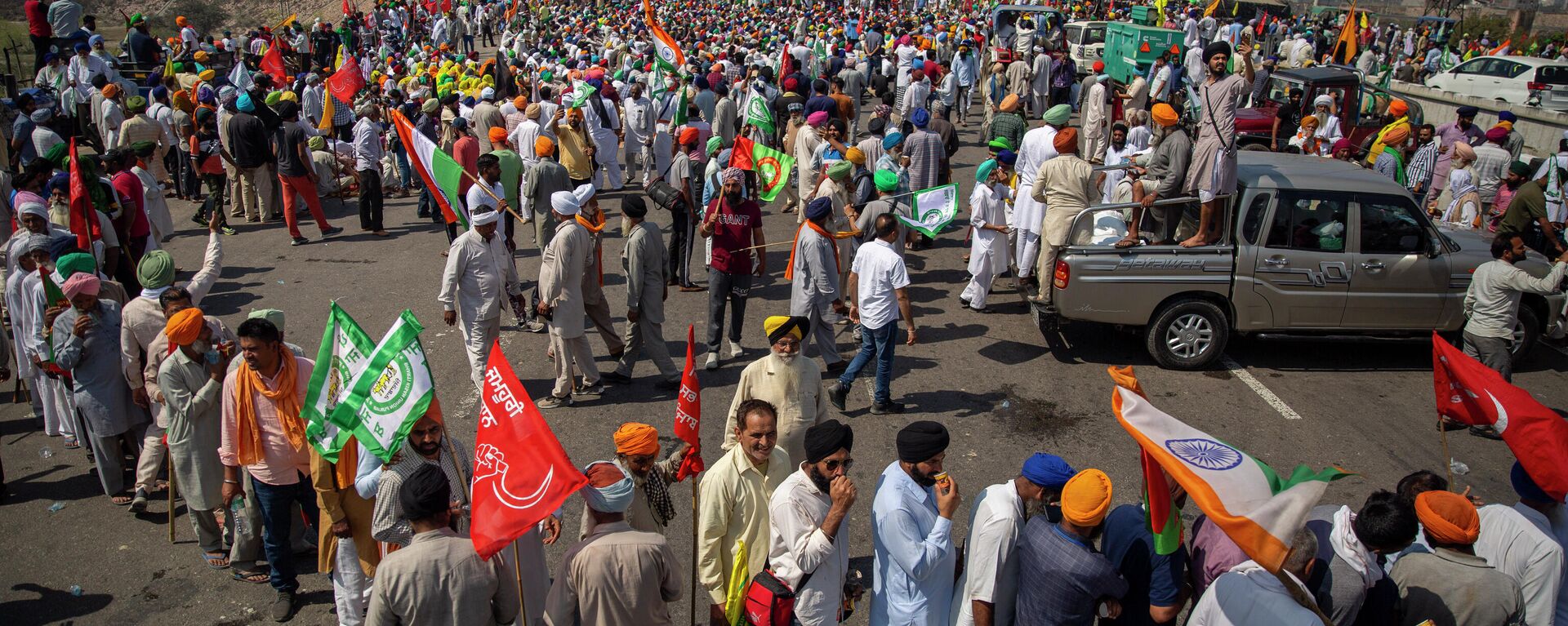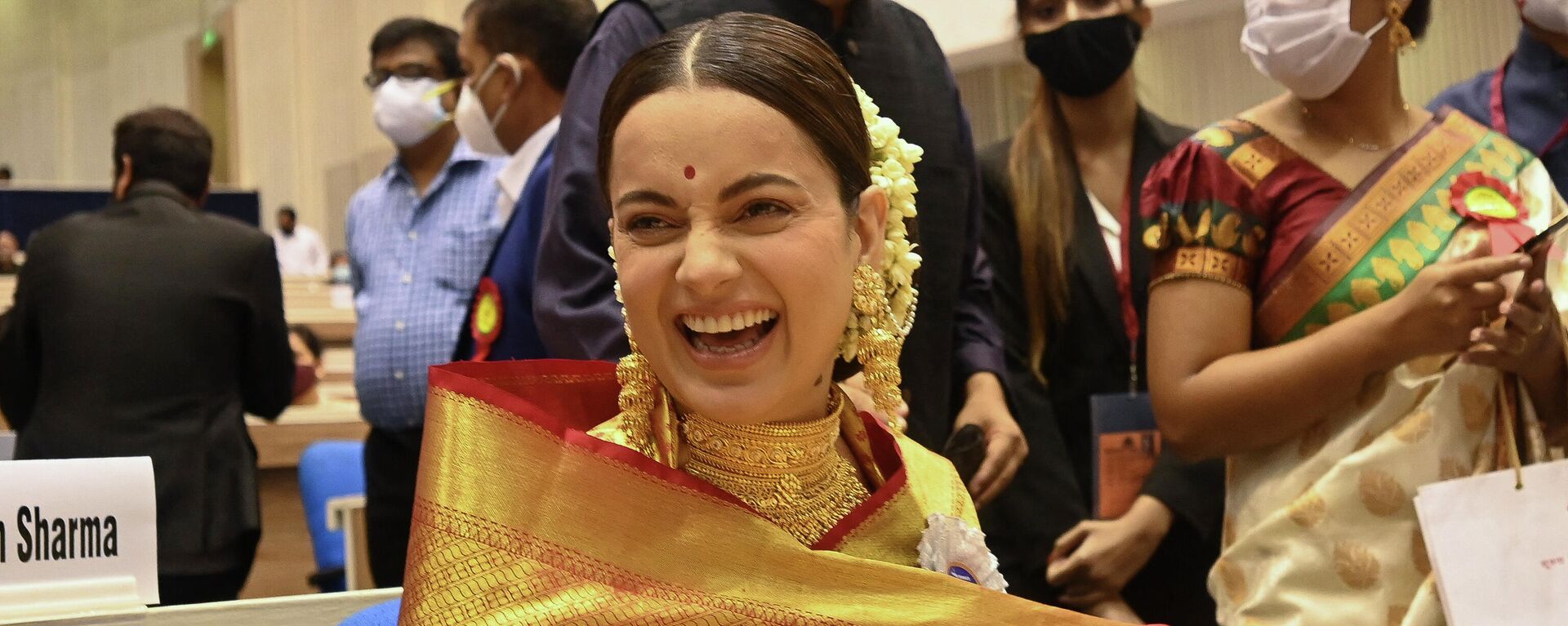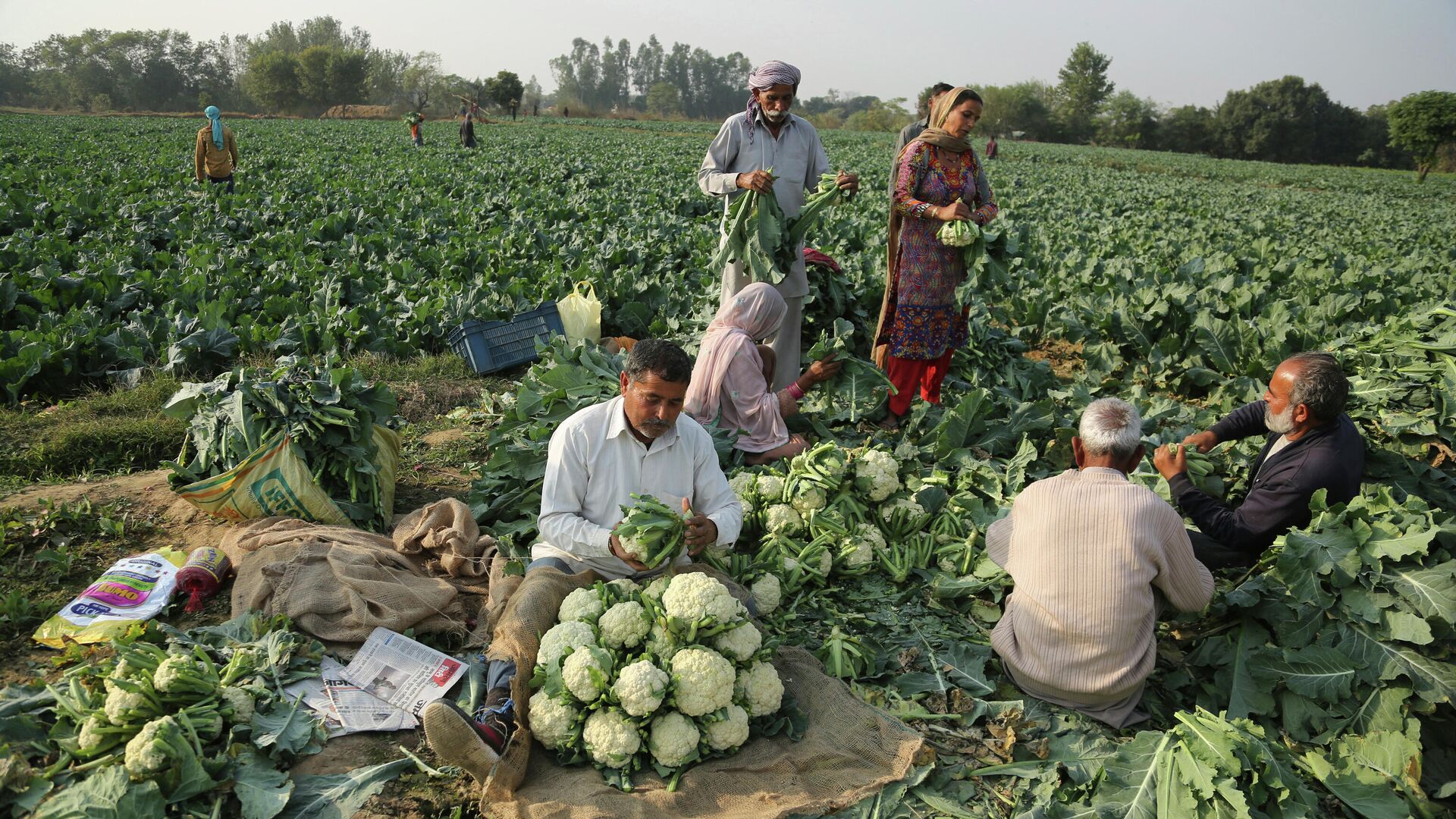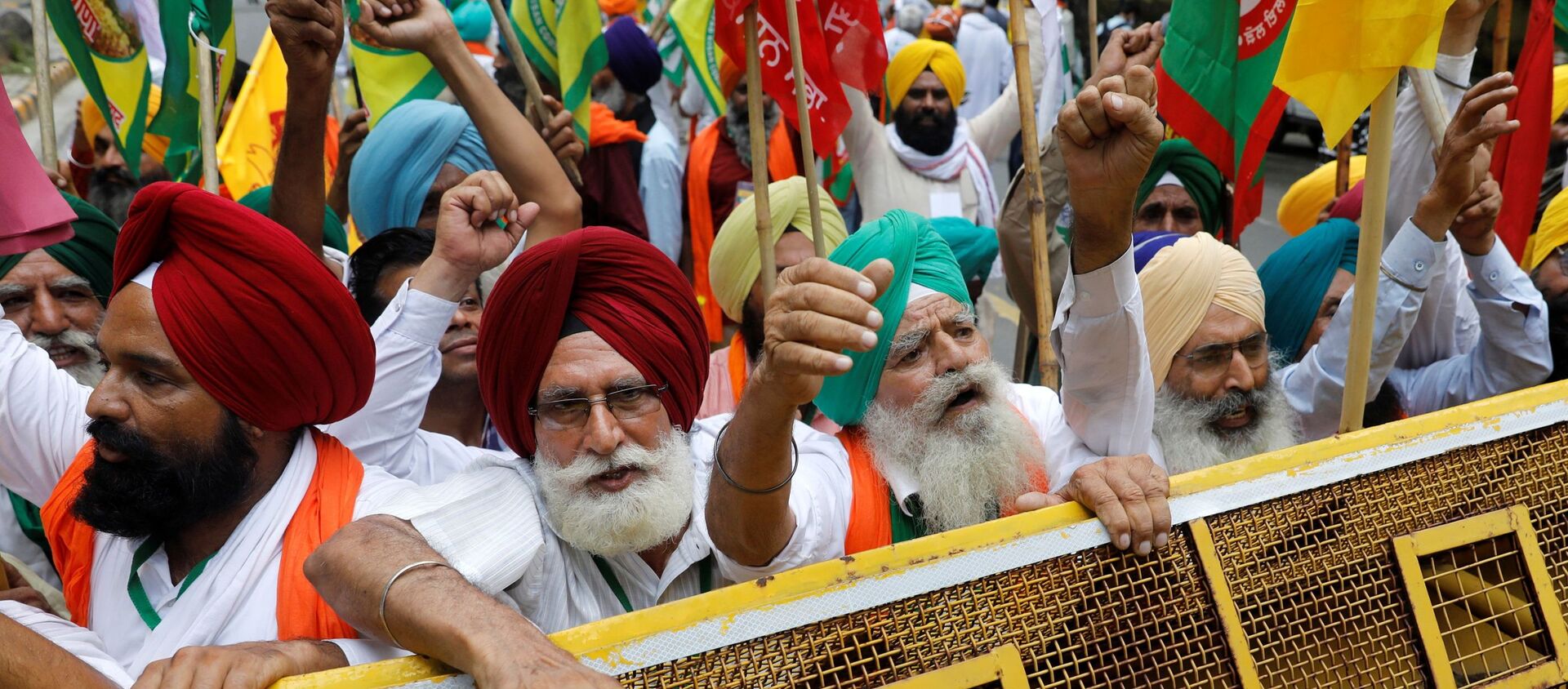https://sputnikglobe.com/20211125/ex-finance-minister-indian-farm-laws-must-be-re-introduced-but-not-the-way-govt-enacted-them-1091008053.html
Ex-Finance Minister: Indian Farm Laws Must Be ‘Re-Introduced’ But Not the Way Gov’t Enacted Them
Ex-Finance Minister: Indian Farm Laws Must Be ‘Re-Introduced’ But Not the Way Gov’t Enacted Them
Sputnik International
Prime Minister Narendra Modi last week announced that he would repeal the three contentious farm laws, which had triggered massive protests. However, the... 25.11.2021, Sputnik International
2021-11-25T11:50+0000
2021-11-25T11:50+0000
2022-07-19T10:40+0000
narendra modi
bharatiya janata party (bjp)
farmers
agriculture
https://cdn1.img.sputnikglobe.com/img/07e5/0b/19/1091012520_0:129:3072:1857_1920x0_80_0_0_360401cd6b77a15b28710ab9464831a3.jpg
On 26 November, India’s farmer protest movement will be a year old. Nearly 700 farmers (as per farmer organisations) have died for different reasons while protesting against the three agricultural liberalisation laws introduced by Prime Minister Narendra Modi’s government in September last year.The Indian government announced on Wednesday (24 November) that it would officially repeal the farm laws in the upcoming Winter Session of the Parliament, thus handing the protesting farmers a hard-earned victory.However, many observers have contended the repeal of the three farm laws could pose a setback to efforts to reform Indian agriculture and allied sectors, which employ 54.6 percent of the country’s workforce. These farm laws are the Farmers' Produce Trade and Commerce (Promotion and Facilitation) Act, 2020; the Farmers' (Empowerment and Protection) Agreement on Price Assurance and Farm Services Act 2020; and the Essential Commodities (Amendment) Ordinance 2020.Most of the Indian farmers are only able to produce enough to sustain their own livelihoods, having very little surplus to sell for profit.Sputnik spoke to India’s former Finance Minister Yashwant Sinha about the need for economic reforms in Indian agriculture. Sinha, who was formerly with the Bharatiya Janata Party (BJP), switched to the Trinamool Congress, an opposition party which humbled the BJP earlier this year in West Bengal state polls.Excerpts:Sputnik: How do you view the government’s decision to repeal the three farm laws? Is it a setback as far as introducing economic reforms to the agricultural sector are concerned?Yashwant Sinha: I wouldn’t consider the decision to repeal the three farm laws a setback.However, proper parliamentary procedures weren’t followed in pushing these farm laws. The government didn’t have enough consultations with the farmers. Reforming an old sector like farming is not an easy task. Reforming any sector in India has never been easy. The government should have moved cautiously while it attempted to reform the agriculture sector through these laws.In this case, the government threw caution to the winds. Overall, the impression which was created among farmers was that the farm laws would only benefit corporate interests rather than their interests.Sputnik: Prime Minister Narendra Modi, while repealing the laws, said that the government hadn't been able to communicate the benefits of the farm laws to the farming community. What do you think?Yashwant Sinha: I don’t buy into that. One must remember that they introduced the new laws by the means of an ordinance. What was the tearing hurry to bring them like that, without following the due parliamentary procedure? Ordinances are meant for very urgent and emergent issues. The farm laws didn’t fall in the category.Then, the government took the farm bills to the parliament and got them passed in a questionable manner. It didn’t refer them to the standing committees where they could have been examined.So, the government committed one mistake after another and it wanted the farmers to understand the benefits. Moreover, the government held many rounds of discussions with the farmers after the laws were enacted last year. Why wasn’t it able to communicate the benefits to them during these discussions?Sputnik: Most of the farmers who were protesting against these farm laws come from only two northern Indian states — Punjab and Haryana. Why didn't these protests resonate with farmers in other parts of the country?Yashwant Sinha: The states of Punjab, Haryana and even the western part of Uttar Pradesh state produce the largest agricultural surplus in the country. The surplus goes into the 'Mandis' (agricultural markets), where the farmers can bargain the best price for their crops.The agricultural-deficit states can’t do the same. As far as the farm laws are concerned, the interests of farmers in these two states are more at stake than those in other parts of the country, where the farmers don’t have much surplus to sell.Sputnik: Were you able to introduce any economic reforms in the agriculture sector while you were India's finance minister?Yashwant Sinha: Well, one has to look at what the farmer actually wants. The farmers want modern-day technology to help boost their productivity. The second thing the farmers want is money (credit/grants) to be able to buy this technology.A revolutionary reform that we had introduced was the ‘Kisan (farmer) credit card’, which helped farmers meet their financial requirements. Then, we had schemes like the 'watershed development programme' and the ‘profitable crops’ programme. The underlying aim of all these programmes was to boost the farmers’ income.Once a farmer’s income is increased, he is able to take care of a lot of other problems.Sputnik: Even after the government’s decision to repeal the farm laws, the farmers have refused to end their agitation. They are now demanding a law to enact Minimum Support Price (MSP). Many economists fear that such a law could lead to rise in food inflation and affect the economic growth. Do you believe that it is a feasible demand on part of protesting farmers?Yashwant Sinha: My recommendation would be that the matter must be discussed with the farmers. But the point is that going about something in an arbitrary fashion, like the government did in the case of these farm laws, creates far more problems that it can resolve.Sputnik: Do you believe that the farm laws, geared to reform the farming sector, should be re-introduced?Yashwant Sinha: They should be re-introduced, but only after following the proper parliamentary procedure and holding proper stakeholder consultations. The farmers’ organisations must be kept in the loop about these reforms.The proper parliamentary practice is that the parliamentary standing committee talks to all the stakeholders and then submits a report to the parliament. The upper and lower houses of the Parliament then must debate on the report before the proposed laws are put to a vote in the Parliament.
https://sputnikglobe.com/20211119/indian-pm-modi-announces-controversial-farm-laws-to-be-withdrawn-urges-farmers-to-end-protests-1090846629.html
https://sputnikglobe.com/20211005/lakhimpur-horror-watch-car-run-over-protesting-farmers-in-india-1089673761.html
https://sputnikglobe.com/20210724/farmer-leader-rakesh-tikait-farm-laws-will-be-scrapped-at-any-cost-1083453031.html
https://sputnikglobe.com/20211124/bollywood-actress-kangana-ranaut-booked-for-calling-sikh-farmers-khalistani-terrorists-1090976118.html
Sputnik International
feedback@sputniknews.com
+74956456601
MIA „Rosiya Segodnya“
2021
News
en_EN
Sputnik International
feedback@sputniknews.com
+74956456601
MIA „Rosiya Segodnya“
Sputnik International
feedback@sputniknews.com
+74956456601
MIA „Rosiya Segodnya“
narendra modi, bharatiya janata party (bjp), farmers, agriculture
narendra modi, bharatiya janata party (bjp), farmers, agriculture
Ex-Finance Minister: Indian Farm Laws Must Be ‘Re-Introduced’ But Not the Way Gov’t Enacted Them
11:50 GMT 25.11.2021 (Updated: 10:40 GMT 19.07.2022) Prime Minister Narendra Modi last week announced that he would repeal the three contentious farm laws, which had triggered massive protests. However, the protesting farmers have refused to return home even after the PM’s announcement. They want the government to now introduce a law to guarantee farmers a minimum support price for their produce.
On 26 November, India’s
farmer protest movement will be a year old. Nearly 700 farmers (as per farmer organisations) have died for different reasons while protesting against the three agricultural liberalisation laws introduced by Prime Minister Narendra Modi’s government in September last year.
The Indian government announced on Wednesday (24 November) that it would officially repeal the farm laws in the upcoming Winter Session of the Parliament, thus handing the protesting farmers a hard-earned victory.

19 November 2021, 05:31 GMT
However, many observers have contended the repeal of the three farm laws could pose a setback to efforts to reform Indian agriculture and allied sectors, which employ 54.6 percent of the country’s workforce.
These farm laws are the Farmers' Produce Trade and Commerce (Promotion and Facilitation) Act, 2020; the Farmers' (Empowerment and Protection) Agreement on Price Assurance and Farm Services Act 2020; and the Essential Commodities (Amendment) Ordinance 2020.
Most of the Indian farmers are only able to produce enough to sustain their own livelihoods, having very little surplus to sell for profit.
Sputnik spoke to India’s former Finance Minister Yashwant Sinha about the need for economic reforms in Indian agriculture. Sinha, who was formerly with the Bharatiya Janata Party (BJP), switched to the Trinamool Congress, an opposition party which humbled the BJP earlier this year in West Bengal state polls.
Sputnik: How do you view the government’s decision to repeal the three farm laws? Is it a setback as far as introducing economic reforms to the agricultural sector are concerned?
Yashwant Sinha: I wouldn’t consider the decision to repeal the three farm laws a setback.
The agricultural sector needs to be reformed, but not exactly in the way the government attempted to do it. Many Indian farmers are going about their agricultural practices like their forefathers would have done. So, there is no doubt about the need for having much more comprehensive reforms than were attempted by the three (rescinded) farm laws.
However, proper parliamentary procedures weren’t followed in pushing these farm laws. The government didn’t have enough consultations with the farmers. Reforming an old sector like farming is not an easy task. Reforming any sector in India has never been easy. The government should have moved cautiously while it attempted to reform the agriculture sector through these laws.

5 October 2021, 11:59 GMT
In this case, the government threw caution to the winds. Overall, the impression which was created among farmers was that the
farm laws would only benefit corporate interests rather than their interests.
Sputnik: Prime Minister Narendra Modi, while repealing the laws, said that the government hadn't been able to communicate the benefits of the farm laws to the farming community. What do you think?
Yashwant Sinha: I don’t buy into that. One must remember that they introduced the new laws by the means of an ordinance. What was the tearing hurry to bring them like that, without following the due parliamentary procedure? Ordinances are meant for very urgent and emergent issues. The farm laws didn’t fall in the category.
Then, the government took the farm bills to the parliament and got them passed in a questionable manner. It didn’t refer them to the standing committees where they could have been examined.
So, the government committed one mistake after another and it wanted the farmers to understand the benefits. Moreover, the government held many rounds of discussions with the farmers after the laws were enacted last year. Why wasn’t it able to communicate the benefits to them during these discussions?
At no point of time were the farmers convinced that the laws would benefit them, in spite of what the government kept saying. It is funny that the government wanted to do good for farmers, but they never wanted that.
Sputnik: Most of the farmers who were protesting against these farm laws come from only two northern Indian states — Punjab and Haryana. Why didn't these protests resonate with farmers in other parts of the country?
Yashwant Sinha: The states of Punjab, Haryana and even the western part of Uttar Pradesh state produce the largest agricultural surplus in the country. The surplus goes into the 'Mandis' (agricultural markets), where the farmers can bargain the best price for their crops.

24 November 2021, 13:38 GMT
The agricultural-deficit states can’t do the same. As far as the farm laws are concerned, the interests of farmers in these two states are more at stake than those in other parts of the country, where the farmers don’t have much surplus to sell.
Sputnik: Were you able to introduce any economic reforms in the agriculture sector while you were India's finance minister?
Yashwant Sinha: Well, one has to look at what the farmer actually wants. The farmers want modern-day technology to help boost their productivity. The second thing the farmers want is money (credit/grants) to be able to buy this technology.
A revolutionary reform that we had introduced was the ‘Kisan (farmer) credit card’, which helped farmers meet their financial requirements. Then, we had schemes like the 'watershed development programme' and the ‘profitable crops’ programme. The underlying aim of all these programmes was to boost the farmers’ income.
Once a farmer’s income is increased, he is able to take care of a lot of other problems.
Sputnik: Even after the government’s decision to repeal the farm laws, the farmers have refused to end their agitation. They are now demanding a law to enact Minimum Support Price (MSP). Many economists fear that such a law could lead to rise in food inflation and affect the economic growth. Do you believe that it is a feasible demand on part of protesting farmers? Yashwant Sinha: My recommendation would be that the matter must be discussed with the farmers.
One must see what exactly they have in mind. If they are suggesting something which is impossible to implement in our system, then it must be explained to them.
But the point is that going about something in an arbitrary fashion, like the government did in the case of these farm laws, creates far more problems that it can resolve.
Sputnik: Do you believe that the farm laws, geared to reform the farming sector, should be re-introduced?
Yashwant Sinha: They should be re-introduced, but only after following the proper parliamentary procedure and holding proper stakeholder consultations. The farmers’ organisations must be kept in the loop about these reforms.
The proper parliamentary practice is that the parliamentary standing committee talks to all the stakeholders and then submits a report to the parliament. The upper and lower houses of the Parliament then must debate on the report before the proposed laws are put to a vote in the Parliament.







